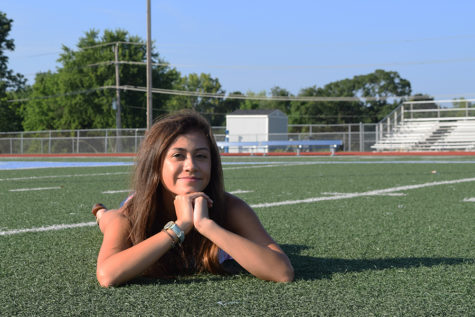Senior Hannah Brauer
Merle Scheff School of Dance
Ballet, tap, lyrical, hip-hop and jazz
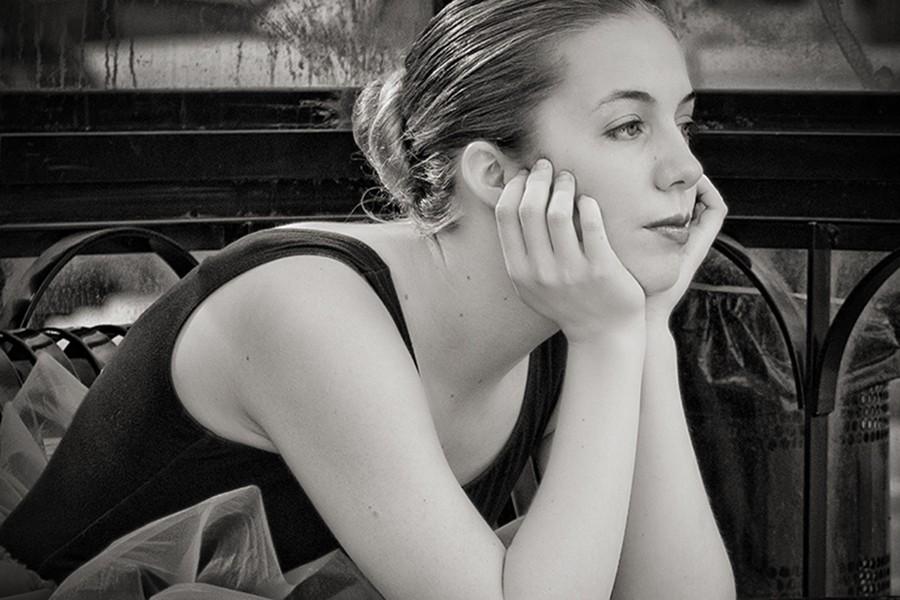
Pathfinder: Why do you dance?
Brauer: There is nothing that brings me greater joy. There’s nothing like being able to connect with the music and express yourself in a way that is not otherwise possible
What makes a dancer?
It takes a lot of determination. The girls at dance have a lot more spirit and they are ready to work.
What is your favorite type of dance?
Ballet and hip-hop. Ballet—I like the way it feels. I like the simplicity yet complexity found in ballet. I like the dedication that is put into it. I like the historical significance. And hip-hop—well, I like the music.
Are you planning on continuing to dance after high school?
Yeah. At least take a few dance classes in college.
What is the hardest part about dance?
Being misunderstood and underestimated. People don’t realize all the hard work you put into it because you’re supposed to look effortless. Especially if you dance outside of school, it’s hard to get recognition for your work because a lot of the athletes here perform on sports teams with the school. That being said if you are on the dance team at school, you would get recognition. It’s like kids taking music lessons
Advice from a dancer to a non-dancer?
You do not know pain until you take a dance class. Go take a ballet class and then you can complain.
Freshman Kristin Priest
Patzius Performing Arts and Midwest Ballet Theatre (pre-professional ballet company)
Ballet, jazz, modern
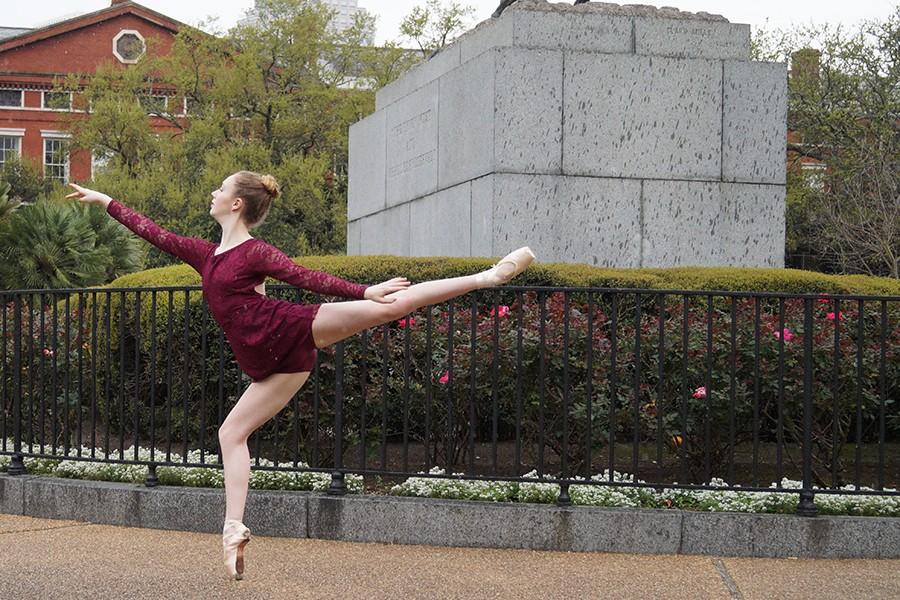
Pathfinder: What does your weekly schedule in dance look like?
Priest: I’m at dance every day after school. It’s about two to two and a half hours every day depending on the classes.
How would you describe the community and the tradition of ballet?
It’s such a tight-knit community, especially because you’re performing an art that not many people understand. Some people don’t understand how moving and powerful a dance can be and the emotion that’s behind it, since you’re with these people everyday after school. They’re lifelong friends.
What is the hardest part about dance?
The hardest part is definitely the commitment. It’s hard to tell your friends, “Sorry I have dance;I can’t do this,” “I can’t do that…” Especially after going home and doing homework late into the night. But it’s a sacrifice I’m willing to make because it’s such an important part of my life. Dance is my life. It’s who I am!
Do you want to make it into a career?
I want to. American Ballet Theatre and New York City Ballet are places I always think about. Recently I haven’t been dancing because I have been diagnosed with juvenile rheumatoid arthritis, so I haven’t been dancing for about a month, but I hope to get back to it soon. It’s been like, “What do I do? I don’t have dance!”
What is it like to perform?
It’s just like I’m so nervous before I go on stage and I worry that I’m going to forget the combo. But when you get on stage it’s like your brain shuts off and you just do it. After being on stage, I’m just so giddy and excited.
What is the typical ballet class like?
You get in and do steps to warm up. Then you do a barre for about an hour, and then we do center for another 45 minutes, with across the floor and adagio. I love center. Center’s fun because you get to do turns in your life.
How do you think dancers are represented in the school community?
I think some people don’t realize how had ballet really is—they think tutus and spinning on the little shoes, but ballet is hard. I don’t think people at West understand. The Longhorn Line is way different than ballet.
Words of wisdom from a dancer to a non-dancer?
Dance is an art. Even if you see it and you may not understand it, dance can really portray a story. It is beautiful art. It is really special to the person who is dancing it, like a song will come on and [I’ll say] “I did a combo to this!”. It’s something that people should appreciate.
Freshman MJ Stricker
Lucille Rapp Dance Studio
Ballet, tap, rhythm tap, jazz, contemporary, modern
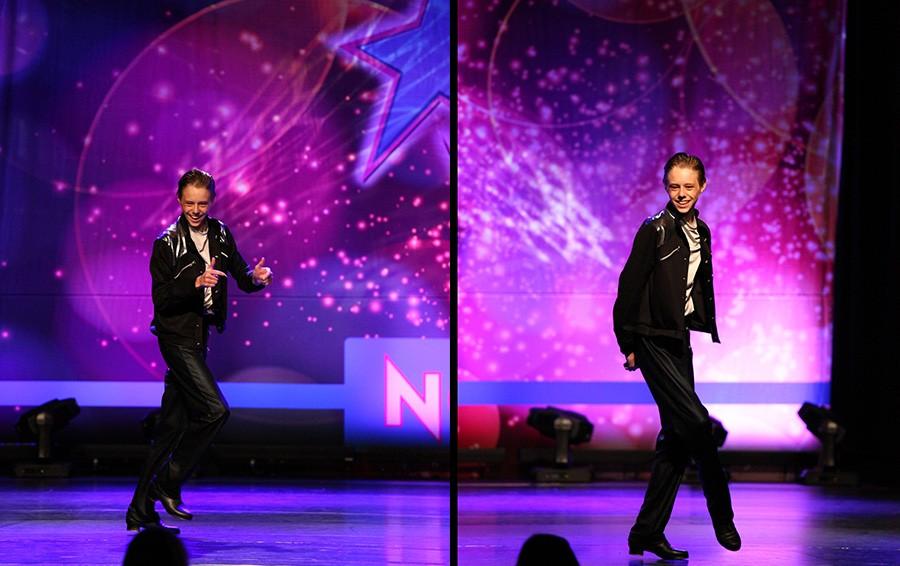
Pathfinder: How many hours do you dance per week?
Ten and a half.
What does dance represent to you?
It’s kind of like my whole life, because I go from school straight to [dance], and I’m there from like three to nine, and then I come home. I think it gets demoted a lot. A lot of people don’t see the importance of it and it gets pushed under the rug.
What is your favorite type of dance? Why?
Tap is my favorite. This summer we went to nationals and I won the Teen Rising Star Solo. I have been tapping since I was two.
What do you think about dance as a sport?
Well, I think it’s the same, because the definition of a sport is anything that has competition and contains physical exertion, and that’s exactly what dance is. I wrote an essay about that last year.
Do you think dancers are underrepresented within the school community?
I think they are. Especially being a guy is hard because people think “Oh, well that’s a girl thing!”.
Do you see yourself dancing in the future?
I don’t actually think so, just because of all of the hours. Dancers have a 13-hour workday. I have a friend that goes to Webster and she has to choose whether to go to the bathroom or eat a banana in the short time between classes. It’s intense.
How has dance shaped you as a person?
I think it has helped a lot. It has helped in school, especially in P.E. with endurance. Also with performing; I can get up and do presentations. I could pick up the choreography in middle school musicals very quickly, and I could help out the people that didn’t get it.
Sophomore Rachel Wang
Dance Project St. Louis and Common Thread Junior Company
Ballet, jazz, modern, pointe
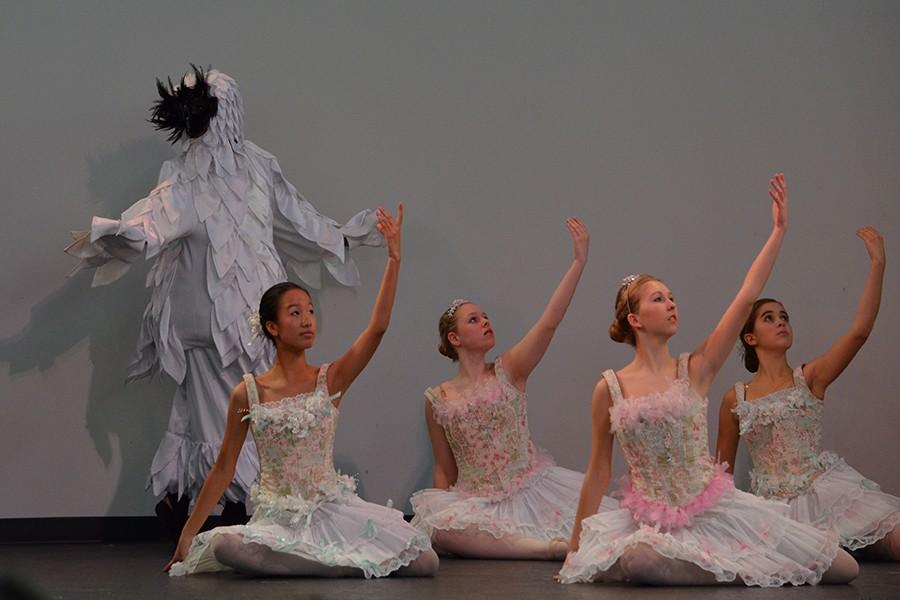
Pathfinder: What is your favorite type of dance? Why?
It depends on the day! In general, I like modern because you can be really fun with it and it incorporates a lot of randomness. The dance community likes to call whatever they don’t know modern. But I love watching pointe.
What is them most painful part of dance?
Going back the first day for pointe and being forced to do pirouettes!
How many hours per week do you train?
It depends on the season. At the very least it will be eight hours, but during Nutcracker season or recital season there will be extra rehearsals and auditions and dress rehearsals and it can get up to like 15 hours.
What do you think dance has done for you as a person?
Dance is one of the most important parts of my life. As cheesy as it sounds, I love it and many of my best memories in life and most important moments are associated with dance and the community we have there. It also helps me to be more creative. Dance is how I can be artistic and expressive.
What dancers or dance celebrities do you look up to?
I’m not big on the whole “looking up to famous people” thing but I look up to my teacher Jen Medina, who’s “mildly famous.” She likes to think she’s famous sometimes. I really like Misty Copeland. I mean, who doesn’t like Misty Copeland? And also Miko Fogarty.
What is one thing you think non-dancers don’t understand about dance?
I think they don’t understand the time commitment, especially with some of my friends. Sometimes they will want to hang out and I will say I have dance and they’ll be like, “Didn’t you have dance last week?” and I’ll be like “I still have it!”. Or sometimes they don’t understand that when they watch it and it looks so effortless and beautiful, there is really a lot of work that goes into it
What message would you like to send to non-dancers?
Next time you watch a dance performance, don’t just clap at the really flexible parts, clap at the flowy beautiful parts, because those are the dancer’s favorite.


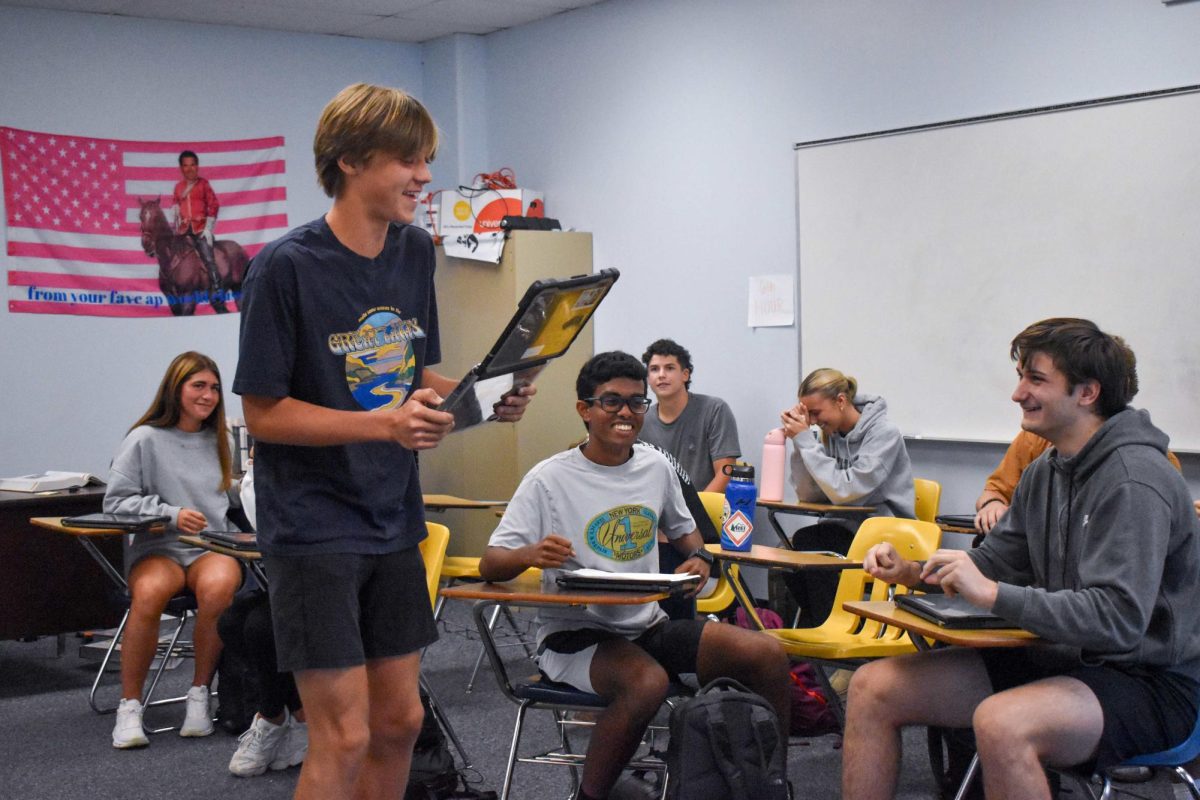
![Freshman Daphne Stokes looks at a table with Veterans Day flyers and information on Nov. 11. Stokes, along with other West High students, like senior Alexander Lewinski, passed by the table in the cafeteria with army recruitment information and giveaways for students to observe during lunch. “Talking with [the recruiters] has definitely helped me [find] where I wanted to go, more than anything else,” Lewinski said.](https://pwestpathfinder.com/wp-content/uploads/2025/11/DSC_1227-2-1200x800.jpg)
![Helping a customer, print room assistant Gretchen Williams operates her booth at the West High Craft Fair from Oct. 25-26. This was Williams’ first time participating in the Craft Fair with her new craft shop, Gs Beaded Boutique. “People have always said, over the years, ‘you should open something.’ [I replied that] I would rather just make [my crafts as] gifts for people. I just started [the online store] up, and it's been okay. I'm always surprised [by] how many views I get and [the] people from different states buying things; somebody from Alaska bought something the other day.”](https://pwestpathfinder.com/wp-content/uploads/2025/11/DSC0451-2-1200x799.jpg)
![Gesturing toward the club’s name on the board, Global Youth Aid co-president year Daniah Alsagheer discusses upcoming service projects with members during a meeting on Oct. 30. “We might be one club at one school, but together, we’re [part of] something much bigger,” Alsagheer said.](https://pwestpathfinder.com/wp-content/uploads/2025/11/DSC00949-1200x800.jpg)
![Focused on providing exceptional service, sophomore Darsh Mahapatra carefully cleans the door of a customer’s car. Mahapatra has always believed his customers deserve nothing less than the best. “[If] they’re trusting us with their car and our service, then I am convinced that they deserve our 100 percent effort and beyond,” Mahapatra said.](https://pwestpathfinder.com/wp-content/uploads/2025/10/DSC_0018-1200x800.jpg)
![Sophomore Aleix Pi de Cabanyes Navarro (left) finishes up a soccer game while junior Ava Muench (right) warms up for cross country practice. The two came to Parkway West High School as exchange students for the 2025-2026 school year. “The goal for the [exchange] program is to provide opportunities for both Parkway students and our international exchange students to learn about other cultures, build connections and become confident, capable, curious and caring — Parkway’s Four C’s — in the process,” Exchange Program Lead Lauren Farrelly said.](https://pwestpathfinder.com/wp-content/uploads/2025/10/Feature-Photo-1200x800.png)

![Gazing across the stage, sophomore Alexis Monteleone performs in the school theater. The Monteleone family’s band “Monte and the Machine” has been releasing music since 2012, but Alexis started her own solo career in 2024 with the release of her first single, Crying Skies. “My whole family is very musical, [and I especially] love writing [songs with them],” Monteleone said.](https://pwestpathfinder.com/wp-content/uploads/2025/09/DSC7463-1200x798.jpg)
![Amid teaching a lesson to her AP Calculus BC class, Kristin Judd jokes alongside her students in their funny remarks. Judd has always enjoyed keeping the mood light in her classroom, along with on the volleyball court. “[I enjoy] that side talk where you see [or] overhear a conversation and chime in, or somebody says something funny,” Judd said.](https://pwestpathfinder.com/wp-content/uploads/2025/09/image-1200x730.jpg)
![Eyeing the ball, junior Ella McNeal poses for her commitment pictures at Clemson University. McNeal’s commitment comes after months of contact with top Division 1 soccer programs. “ It has taken a lot to get to where I am, but I know that [what] I've already been through is just the beginning, and I can't wait for what is to come,” McNeal said.](https://pwestpathfinder.com/wp-content/uploads/2025/09/IMG_4926-1200x900.jpeg)
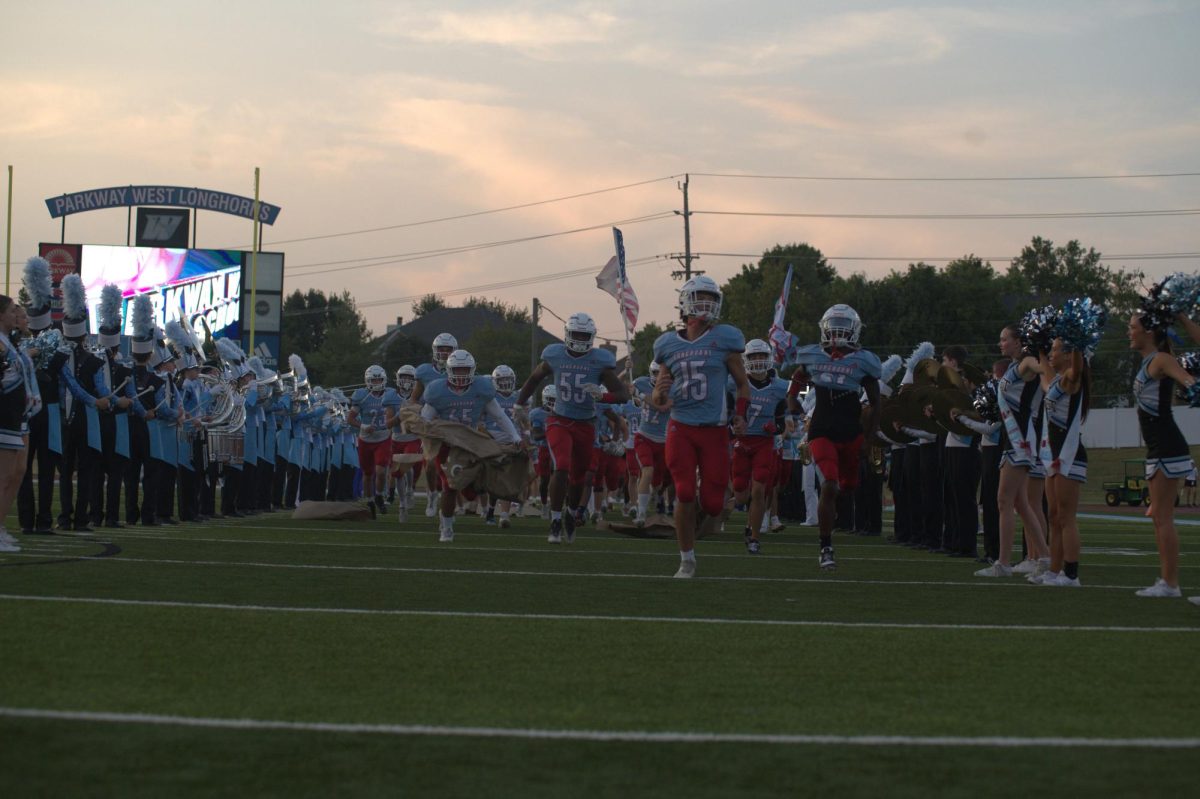
![Sophomore Shree Sikkal Kumar serves the ball across the court in a match against Lindbergh. Sikkal Kumar has been a varsity member of the varsity girls’ tennis team for two years, helping her earn the number two rank in Class 2 District 2.“When matches are close, it’s easy to get nervous, but I [ground] myself by[staying] confident and ready to play,” Sikkal Kumar said.](https://pwestpathfinder.com/wp-content/uploads/2025/11/DSC2801-1200x798.jpg)
![Dressed up as the varsity girls’ tennis coach Katelyn Arenos, senior Kate Johnson and junior Mireya David hand out candy at West High’s annual trunk or treat event. This year, the trunk or treat was moved inside as a result of adverse weather. “As a senior, I care less about Halloween now. Teachers will bring their kids and families [to West’s Trunk or Treat], but there were fewer [this year] because they just thought it was canceled [due to the] rain. [With] Halloween, I think you care less the older you get,” Johnson said.](https://pwestpathfinder.com/wp-content/uploads/2025/10/DSC00892-1-1200x800.jpg)
![Leaning on the podium, superintendent Melissa Schneider speaks to Parkway journalism students during a press conference. Schneider joined Parkway in July after working in the Thompson School District in Colorado. “My plan [to bond with students] is to get things on my calendar as much as possible. For example, being in [classes] is very special to me. I am trying to be opportunistic [meeting] kids [and] being in [the school] buildings. I have all the sports schedules and the fine arts schedules on my calendar, so that when I'm available, I can get to them,” Schneider said.](https://pwestpathfinder.com/wp-content/uploads/2025/09/IMG_5425-1200x943.jpeg)

![Leaping through the air, senior Tyler Watts celebrates his first goal of the season, which put the Longhorns up 1-0 against the Lafayette Lancers. Watts decided to play soccer for West for his last year of high school and secured a spot on the varsity roster. “[Playing soccer for West] is something I had always dreamed of, but hadn’t really had a good opportunity to do until now. It’s [really] fun being out [on the field], and I’m glad I decided to join the team. It’s just all about having fun with the boys and enjoying what time we have left together,” Watts said.](https://pwestpathfinder.com/wp-content/uploads/2025/09/DSC_1951-1200x855.jpg)

![Shifting global trade, President Donald Trump’s tariffs are raising concerns about economic stability for the U.S. and other countries alike. “[The tariffs are] going to pose a distinct challenge to the U.S. economy and a challenge to the global economy on the whole because it's going to greatly upset who trades with who and where resources and products are going to come from,” social studies teacher Melvin Trotier said.](https://pwestpathfinder.com/wp-content/uploads/2025/05/MDB_3456-1200x800.jpg)

![Pitching the ball on Apr. 14, senior Henry Wild and his team play against Belleville East. Wild was named scholar athlete of the year by St. Louis Post-Dispatch after maintaining a high cumulative GPA and staying involved with athletics for all of high school. “It’s an amazing honor. I feel very blessed to have the opportunity to represent my school [and] what [it] stands for,” Wild said.](https://pwestpathfinder.com/wp-content/uploads/2025/05/unnamed-6-1200x714.jpg)
